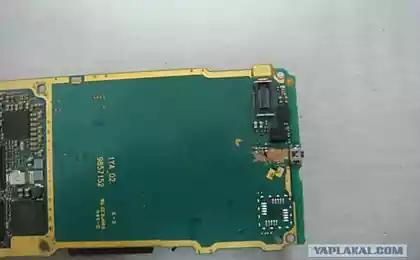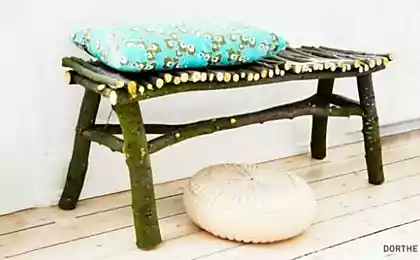2003
10 amazing ideas that brought millions of
Have you ever looked at any product or company and thought "Why did I not think of this before?" As long as people all day long dream to get rich quickly, just a little lucky to embody the idea of a million.
Some enterprising people got rich on everyday things, such as clothing or food. Some came to a surprising ideas. This can be a simple solution or a completely unique. In any case, these ideas will surprise you and is likely to make jealous of their owners.
Now we will see 10 of the most amazing ideas that have brought more than one million, and how the people who invented them, make their ideas a reality.
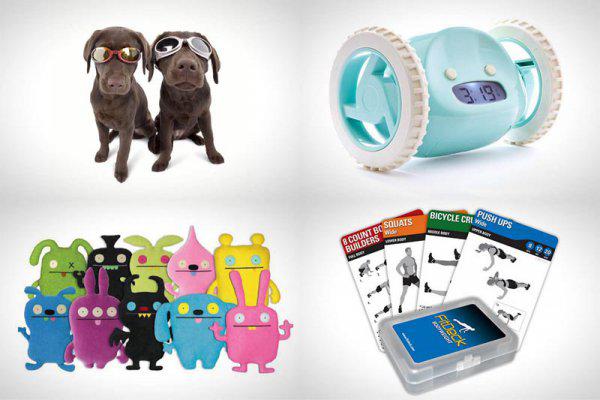
1. Points for dogs Doggles
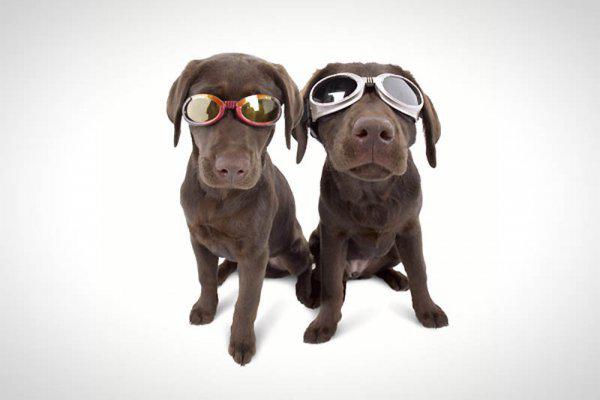
These points are intent Roni di Llull, which this great idea came during a walk in the park for dogs in 1997. Her Border Collie Midnight prevented bright daylight, and the dog could not normally catch a frisbee. "I was wearing my sunglasses, and I thought, well why do dogs they do not," says Ronnie.
And di Lulli start tinkering his dog sunglasses. At first she tried to adapt ordinary glasses with a variety of straps. Then she sap money and made a new model that accurately fit the face of a dog. Born and glasses for dogs. Now dogs can be put out of their cars without fear, since glasses do not only protect from harmful UV-rays, but also from dust and dirt.
Company Di Lillo, MidKnight Creations, with annual revenue of about $ 3 million now also produces backpacks, jackets and swimming toys for cats.
2. runaway alarm clock Clocky
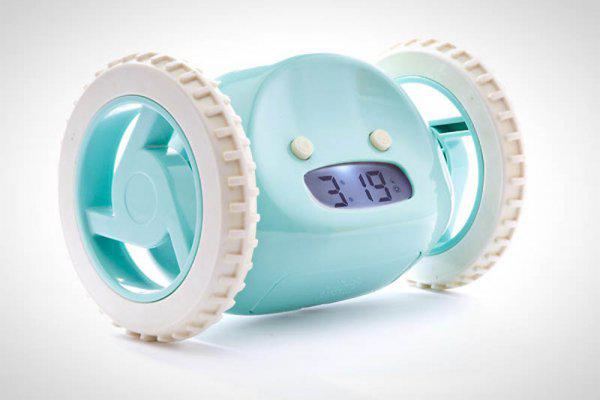
Gauri Nanda loved and liked to sleep in the morning to press the END button on the alarm clock ... many times. And when it's time to make a test project at the Massachusetts Institute of Technology, to mind immediately went to her runaway alarm clock. Equipped with two wheels, after pressing the end call, alarm pulls off the nightstand and rolls on the floor, forcing the owner Sonya get out of bed.
Once Nanda graduated, she found its prototype, the family took the money and began a massive sell new alarm clocks. At this point, the evader Service is sold in thousands of stores in more than 45 countries around the world and brought its inventor has about $ 10 million. There is also a version Tocky, she had missing wheels and used for the movement of the internal torque.
3. Billy Bob Teeth (Teeth Billy Bob)

These false teeth were designed to turn any man in "redneck". John White first saw them at a football match in 1994. The man with the "horrible teeth," said "some nonsense," says White. It turned out that it was his friend Rich Bailey, and his teeth were not real - he made them in the dental school. White saw an opportunity and asked him to make Bailey set.
While White lived in a shack behind the house parents and worked at odd jobs to pay their debts. Soon, White and Bailey started to sell retail Billy Bob teeth, but after a couple of years, Bailey left the company to pursue a career dentist.
The company now produces White sandals, hats and other things Billy Bob. He also moved to a new home thanks to more than 50 million profit from the company for all time of its existence.
4. Fork Knife Knork
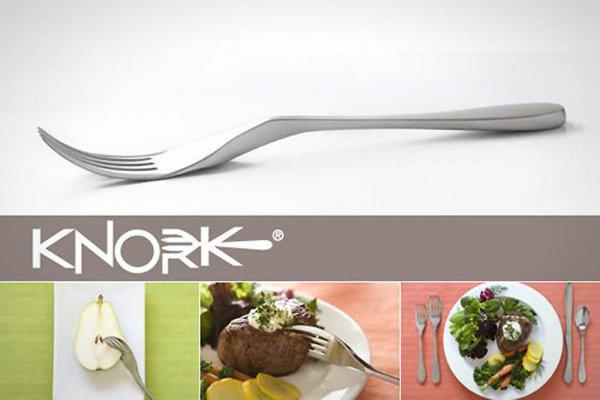
If, during the meal, and you are tired to use a knife and fork, then Knork can provide you with some interesting ... fork and knife in one cutlery.
This idea came to Mike Miller back in eighth grade, when he tried to eat pizza with a fork. While he tried in vain to tear the pizza, he noticed how easily worker cuts its special knife. And then he thought that the fork with a knife on one of the edges of the handle is not worse.
However, Miller did not even think to develop his idea before he entered the college in 2001. His grandfather, he took $ 10,000, has created his own company and developed a prototype using my mother's forks and grinding wheel in the garage.
A few years later products Knork rushed to the shops and online catalogs. Now the company Knork develops and moves to full-scale production. In 2011, sales totaled Knork Flatware about $ 2 million.
5. Balls SENDaBALL
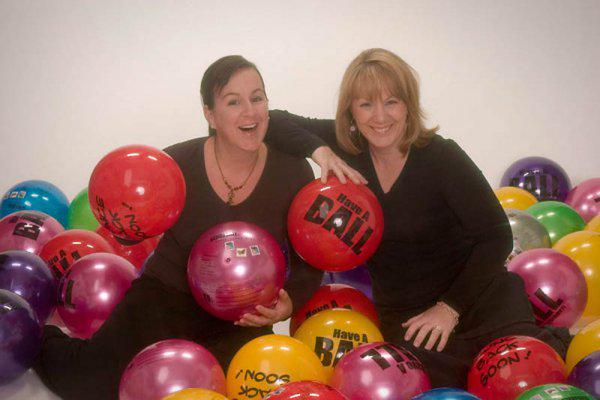
SENDaBALL balls can be seen as one of the types of cards. It all started when Michelle Sipolt cabbage saw a bunch of balls in the store, they wrote "Give your child a ball", pasted stamp and sent to his girlfriend.
In the next few years, cabbage and her sister Melissa Sipolt Moroko sent balls friends on different occasions. Once in the queue at the post office one man asked Michelle and send him a ball. And then the sisters saw an opportunity. In 2003 they created a website and opened a shop in his garage, where he is now. At the moment, the total profit from the sale of balls SENDaBALL was $ 1 million.
6. Razor Head HeadBlade
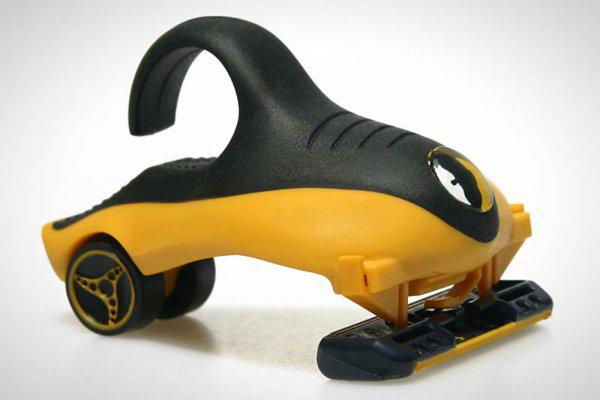
Todd Greene long puzzled and came up with HeadBlade. After his 20 years in the hair began to fall, he decided to shave his head. And then he realized that such classes should be a special razor. "If I could just take the blade in his hand, it would be much easier to shave," says Todd.
And so, in 1998 he designed a prototype that is convenient to lay in his hand, and found the man who helped him improve it. Green took all his money borrowed from family and friends, and then founded the company. He found a producer, made a website, learned ecommerce and marketing.
Everything went even better when Time magazine named the invention of the Green one of the best in 2000. Now HeadBlade sold at 15-20 thousand stores across America and brings an annual income of 10.7 million dollars.
7. thymus bone.
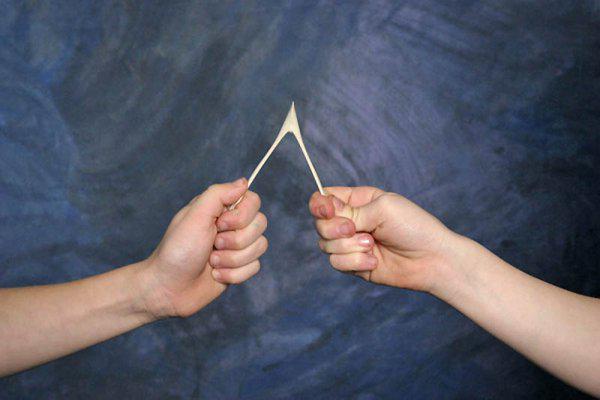
In America on Thanksgiving Day has a tradition of breaking a bone from the thymus eaten turkey, who will have more bite, that wish will come true. But all seeds will not save enough, because turkey is also not cheap, but only one bone. Plastic thymus bones may seem too simple idea, but this idea has brought millions. Ken Aron had this idea during dinner Thanksgiving Day in 1999. He realized that the table has only one bone and it can dry out before all who decide to break it. He decided that the artificial bone resolve family disputes and allow all to make a wish on Thanksgiving Day. He did some research and found a "secret formula", which allows the artificial bone fracture as real.
By 2004, the sale was conducted in all 10 stores, now thymus bones are sold in over 800 stores across America and brought $ 4 million profit from the date of its introduction.
8. monsters Uglydoll
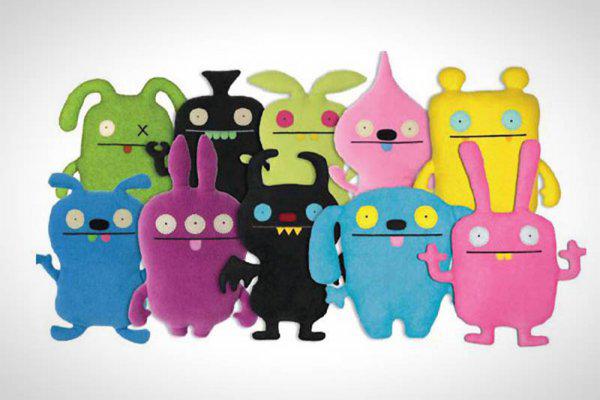
Uglydoll monsters can look and not very, but the profit brought good - more than $ 100 million since its introduction in stores.
Uglydoll is not only a success story, but also a love story. It all started in 1996, when the San Min Kim and David Horvath met at the School of Art and Design Parson. Then, when Kim went to Korea, they had to leave for a few years, but they continued to communicate, leading an active correspondence. In one of these letters, David painted the small orange monsters named Wage. Kim sent him back to his own gift already sewn toy Wage. When Croatia took the toy in the Asian pop art shop in Los Angeles, the owner asked for more. New dolls that Kim months sewed by hand, sold out in one day.
In 2002, Kim and Croatia have not only opened his own company Pretty Ugly, but also married.
9. Goose police

In 1986, David Marx worked at a golf club in Greenwich, Connecticut, and fought with the 600 Canadian geese that lived in the area. That he had not tried to banish them, nothing happened. Until that moment, he decided to use a Border Collie. He bought a dog, train it, and soon the geese were gone. News quickly dispersed throughout the area and now the other golf clubs asking for his help. Marx decided to create a goose police and started to deliver the golf course from the pesky geese.
In the end, Marx quit his job to concentrate fully on the new business. The company grew and now it is fixed 11 areas across the country. Under the command of David is now 38 dogs, and the company is worth 2, 8 million dollars a year.
"Who would have thought that I would earn millions, being played with the dogs," says Marx.
10. Fitness card FitDeck
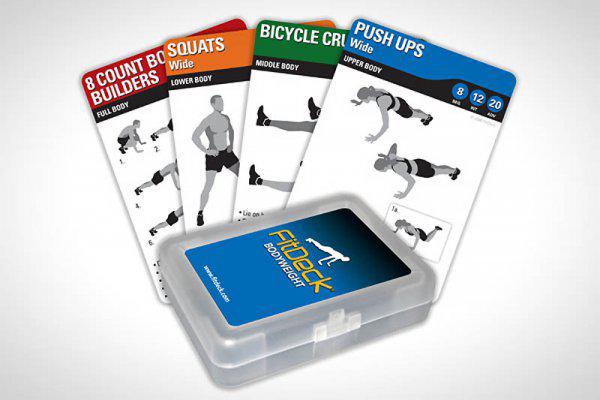
In this card game party held not at the table: it is designed to bring players into shape. The deck contains 50 exercises that do not require simulators. These cards are the brainchild of Phil Black's, which this idea came after the party cards in college turned into a competition for pushups.
Black did not immediately set up his own company. At first, he served in the Navy fur seal, and then graduated from the school of business. After Phil it was finished, he went to a desk job to Goldman Sachs, but resigned after six months. He used his savings and workouts fur seal to create maps FitDeck. Now there are 37 different decks.
Black said that to date has sold "hundreds of thousands of decks" and earned "a few million dollars."
Some enterprising people got rich on everyday things, such as clothing or food. Some came to a surprising ideas. This can be a simple solution or a completely unique. In any case, these ideas will surprise you and is likely to make jealous of their owners.
Now we will see 10 of the most amazing ideas that have brought more than one million, and how the people who invented them, make their ideas a reality.

1. Points for dogs Doggles

These points are intent Roni di Llull, which this great idea came during a walk in the park for dogs in 1997. Her Border Collie Midnight prevented bright daylight, and the dog could not normally catch a frisbee. "I was wearing my sunglasses, and I thought, well why do dogs they do not," says Ronnie.
And di Lulli start tinkering his dog sunglasses. At first she tried to adapt ordinary glasses with a variety of straps. Then she sap money and made a new model that accurately fit the face of a dog. Born and glasses for dogs. Now dogs can be put out of their cars without fear, since glasses do not only protect from harmful UV-rays, but also from dust and dirt.
Company Di Lillo, MidKnight Creations, with annual revenue of about $ 3 million now also produces backpacks, jackets and swimming toys for cats.
2. runaway alarm clock Clocky

Gauri Nanda loved and liked to sleep in the morning to press the END button on the alarm clock ... many times. And when it's time to make a test project at the Massachusetts Institute of Technology, to mind immediately went to her runaway alarm clock. Equipped with two wheels, after pressing the end call, alarm pulls off the nightstand and rolls on the floor, forcing the owner Sonya get out of bed.
Once Nanda graduated, she found its prototype, the family took the money and began a massive sell new alarm clocks. At this point, the evader Service is sold in thousands of stores in more than 45 countries around the world and brought its inventor has about $ 10 million. There is also a version Tocky, she had missing wheels and used for the movement of the internal torque.
3. Billy Bob Teeth (Teeth Billy Bob)

These false teeth were designed to turn any man in "redneck". John White first saw them at a football match in 1994. The man with the "horrible teeth," said "some nonsense," says White. It turned out that it was his friend Rich Bailey, and his teeth were not real - he made them in the dental school. White saw an opportunity and asked him to make Bailey set.
While White lived in a shack behind the house parents and worked at odd jobs to pay their debts. Soon, White and Bailey started to sell retail Billy Bob teeth, but after a couple of years, Bailey left the company to pursue a career dentist.
The company now produces White sandals, hats and other things Billy Bob. He also moved to a new home thanks to more than 50 million profit from the company for all time of its existence.
4. Fork Knife Knork

If, during the meal, and you are tired to use a knife and fork, then Knork can provide you with some interesting ... fork and knife in one cutlery.
This idea came to Mike Miller back in eighth grade, when he tried to eat pizza with a fork. While he tried in vain to tear the pizza, he noticed how easily worker cuts its special knife. And then he thought that the fork with a knife on one of the edges of the handle is not worse.
However, Miller did not even think to develop his idea before he entered the college in 2001. His grandfather, he took $ 10,000, has created his own company and developed a prototype using my mother's forks and grinding wheel in the garage.
A few years later products Knork rushed to the shops and online catalogs. Now the company Knork develops and moves to full-scale production. In 2011, sales totaled Knork Flatware about $ 2 million.
5. Balls SENDaBALL

SENDaBALL balls can be seen as one of the types of cards. It all started when Michelle Sipolt cabbage saw a bunch of balls in the store, they wrote "Give your child a ball", pasted stamp and sent to his girlfriend.
In the next few years, cabbage and her sister Melissa Sipolt Moroko sent balls friends on different occasions. Once in the queue at the post office one man asked Michelle and send him a ball. And then the sisters saw an opportunity. In 2003 they created a website and opened a shop in his garage, where he is now. At the moment, the total profit from the sale of balls SENDaBALL was $ 1 million.
6. Razor Head HeadBlade

Todd Greene long puzzled and came up with HeadBlade. After his 20 years in the hair began to fall, he decided to shave his head. And then he realized that such classes should be a special razor. "If I could just take the blade in his hand, it would be much easier to shave," says Todd.
And so, in 1998 he designed a prototype that is convenient to lay in his hand, and found the man who helped him improve it. Green took all his money borrowed from family and friends, and then founded the company. He found a producer, made a website, learned ecommerce and marketing.
Everything went even better when Time magazine named the invention of the Green one of the best in 2000. Now HeadBlade sold at 15-20 thousand stores across America and brings an annual income of 10.7 million dollars.
7. thymus bone.

In America on Thanksgiving Day has a tradition of breaking a bone from the thymus eaten turkey, who will have more bite, that wish will come true. But all seeds will not save enough, because turkey is also not cheap, but only one bone. Plastic thymus bones may seem too simple idea, but this idea has brought millions. Ken Aron had this idea during dinner Thanksgiving Day in 1999. He realized that the table has only one bone and it can dry out before all who decide to break it. He decided that the artificial bone resolve family disputes and allow all to make a wish on Thanksgiving Day. He did some research and found a "secret formula", which allows the artificial bone fracture as real.
By 2004, the sale was conducted in all 10 stores, now thymus bones are sold in over 800 stores across America and brought $ 4 million profit from the date of its introduction.
8. monsters Uglydoll

Uglydoll monsters can look and not very, but the profit brought good - more than $ 100 million since its introduction in stores.
Uglydoll is not only a success story, but also a love story. It all started in 1996, when the San Min Kim and David Horvath met at the School of Art and Design Parson. Then, when Kim went to Korea, they had to leave for a few years, but they continued to communicate, leading an active correspondence. In one of these letters, David painted the small orange monsters named Wage. Kim sent him back to his own gift already sewn toy Wage. When Croatia took the toy in the Asian pop art shop in Los Angeles, the owner asked for more. New dolls that Kim months sewed by hand, sold out in one day.
In 2002, Kim and Croatia have not only opened his own company Pretty Ugly, but also married.
9. Goose police

In 1986, David Marx worked at a golf club in Greenwich, Connecticut, and fought with the 600 Canadian geese that lived in the area. That he had not tried to banish them, nothing happened. Until that moment, he decided to use a Border Collie. He bought a dog, train it, and soon the geese were gone. News quickly dispersed throughout the area and now the other golf clubs asking for his help. Marx decided to create a goose police and started to deliver the golf course from the pesky geese.
In the end, Marx quit his job to concentrate fully on the new business. The company grew and now it is fixed 11 areas across the country. Under the command of David is now 38 dogs, and the company is worth 2, 8 million dollars a year.
"Who would have thought that I would earn millions, being played with the dogs," says Marx.
10. Fitness card FitDeck

In this card game party held not at the table: it is designed to bring players into shape. The deck contains 50 exercises that do not require simulators. These cards are the brainchild of Phil Black's, which this idea came after the party cards in college turned into a competition for pushups.
Black did not immediately set up his own company. At first, he served in the Navy fur seal, and then graduated from the school of business. After Phil it was finished, he went to a desk job to Goldman Sachs, but resigned after six months. He used his savings and workouts fur seal to create maps FitDeck. Now there are 37 different decks.
Black said that to date has sold "hundreds of thousands of decks" and earned "a few million dollars."

















